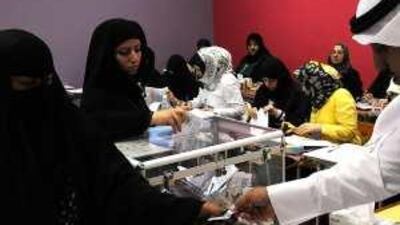KUWAIT CITY // Kuwaitis voted for a new parliament yesterday in an election that is widely expected to usher in the country's first female MPs. The candidates numbered 210, including 16 women, competing for 50 seats in parliament. Official results were not expected until today. The emir, Sheikh Sabah Al Ahmad Al Jaber Al Sabah, dissolved parliament and called for elections in April to protect his nephew, the prime minister Sheikh Nasser Mohammed Al Ahmed Al Sabah, from three motions by MPs to question him in parliament. The dissolution was part of a pattern of increasing instability in the Gulf's oldest parliament. The cabinet has resigned five times and the emir has dissolved three parliaments since Sheikh Nasser was appointed in Feb 2006. The election marks the second time Kuwaitis vote in five electoral districts, with the top 10 in each gaining a seat. Kuwaitis can vote for up to four candidates in their district. About 385,000 Kuwaitis over the age of 21 were eligible to vote. The official news agency, Kuna, reported turnout of 38 per cent. Kuwait's new MPs, men or women, will face the difficult task of turning parliament into an institution that can aid Kuwaiti development. The next parliament will have to vote on an economic stimulus package worth US$5 billion (Dh18bn). "We need women in the parliament to deal with women's issues," said Maha al Turaigi, a second constituency voter who wears a niqab. Ms al Turaigi said one of her votes went to Salwa al Jassar, the chief of a centre for empowering women. Polls suggest Ms al Jassar will be one of four women present in the forthcoming assembly. Election centres opened at 8am in 94 schools across the country. Women and men voted in separate facilities. Crowds of the candidates' supporters gathered in groups in front of the schools to coax undecided voters. Even though 55 per cent of Kuwait's electorate is female, they have failed in two attempts to reach parliament since gaining full political rights in 2005. They fared well enough in opinion polls this year to give some Kuwaitis hope the glass ceiling will break. For example, polls ranked Rola Dashti, the chairwoman of the Kuwait Economic Society, in the top 10 in the third district. Another woman with a chance of winning a seat was Thekra al Rasheedi, running in the fourth district. Ms al Rasheedi was ranked 11th in polls and was the only woman to be ranked well in either the fourth or fifth districts, which are dominated by Kuwait's conservative tribes. A political scientist at Kuwait University, Ghanim al Najjar, said if Ms al Rasheedi wins it will be a "real coup". Not all Kuwaitis like the idea of female MPs. A row broke out last week when one of the smaller Islamist parties issued a fatwa saying it was a sin to vote for female candidates. In another incident, Aseel al Awadhi, who finished in 11th place in last year's election and whom opinion polls ranked second in the third district, was called an infidel by an Islamist candidate, the Kuwait Times reported. "Women won't make it here," said Ahmad Mustafa from the second district, which is fiercely contested by Islamists and liberals. "I won't vote for them. It's a religious matter: women are weak." Other men were happy to give women their support. "This time women will do it," said Salah Jassim Allinqawi, who lives in the first district. "Let's hope four of them make it to the parliament." Mr Allinqawi said he gave one of his votes to Massouma al Mubarak, who was Kuwait's first female minister and led her district in the polls. "This is the last chance we have for democracy," he said. "The emir sent a clear message with the dissolution of parliament. MPs in the last parliament worked in their own interest: it was a disaster." "We all say women are emotional, but it's the men who are emotional," said Fuad al Hassan, who votes in the fifth district. "The female politicians are ruthless - very hard. "Women can change things in the parliament, they will bring a different style," Mr al Hassan said. "Lot's of men will vote for Massouma. We won't be surprised if she wins." "I think 75 per cent of the MPs will be elected for the first time and we will have one woman," said Khalid al Yousef, a first district voter who voted for male, Sunni candidates. "But nothing will change anyway. We'll be back here having another election within a year." jcalderwood@thenational.ae

Big gender barrier is expected to fall in Kuwait
Despite a fatwa from a small Islamist party that said voting for women is a sin, polls indicate four may win seats in the national assembly
Most popular today
6
